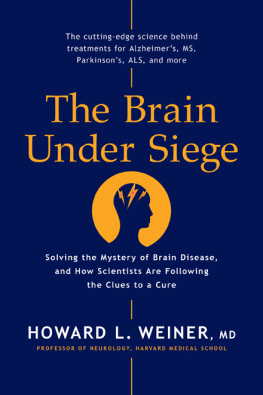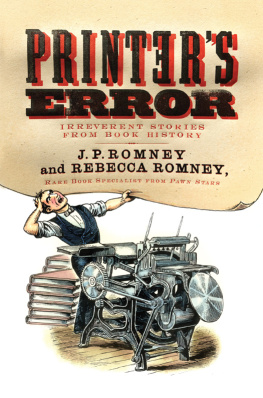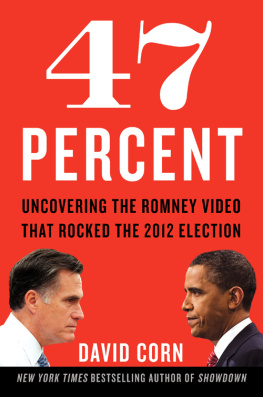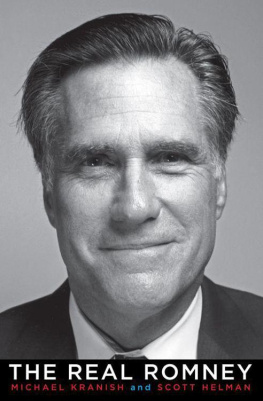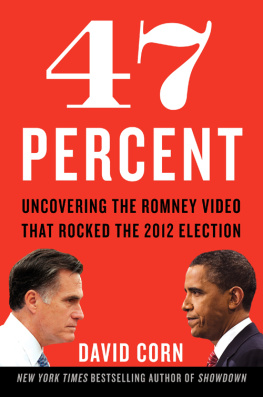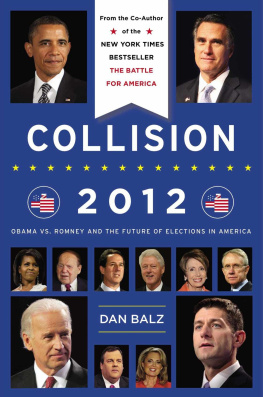Contents
Guide

The author and publisher have provided this e-book to you for your personal use only. You may not make this e-book publicly available in any way. Copyright infringement is against the law. If you believe the copy of this e-book you are reading infringes on the authors copyright, please notify the publisher at: us.macmillanusa.com/piracy.
For the more than 50 million people worldwide affected by neurologic diseasesand for their loved oneshope is on the way.
M Y SON T AGG was working for the Los Angeles Dodgers when Mitt decided he was going to run for president. Tagg enjoyed working for the Dodgers, but he also wanted to come back East to be part of his fathers campaign. One afternoon he was talking to the legendary broadcaster Vin Scully and asked for a little advice. Im thinking about leaving, Tagg said, then started outlining his plans.
Scully listened for several minutes as Tagg laid out his future, then smiled and grabbed Taggs arm. Son, he said, if you want to make God laugh, just tell him your plans.
I was sitting in a Sunday school class in our church one morning in the early 1990s. We were having a discussion about the various ways people deal with difficult situations. And I remember thinking that many people dont have a huge growth experience until theyve had to face a particular challenge. Wow , I thought, my life is pretty good. Im married to a wonderful and successful man; we have five smart, active, healthy boys; and were living comfortably in Boston . At that time, both Mitts and my parents were alive and they, too, were wonderful people who continued to play important roles in our family life. In fact, as I sat there, I couldnt think of any challenges in my life that had been really difficult to overcome. I took a very deep and satisfied breath. Believe me, I knew how incredibly lucky I was.
The challenges we had faced werent any different from those of most American families. Raising five boys, we were on a first-name basis with the staff at the local emergency room. We went through all the bloody noses and the broken bones. When our son Ben was ten months old he became ill with what turned out to be a combination of the flu, an infection, and an allergy to penicillin. He was wasting away from something that in earlier times would have killed him. I sat with him for seven days without leaving the hospital as he was treated with IV fluids and eventually got well.
With six men in our house, life often was organized chaos. There was always something unexpected that had to be done right away. It seemed that we were endlessly running from one game to another, from Scout meeting to church event. There was homework to be done and parent-teacher conferences to attend, and there were the everyday problems of five young males racing through childhood and into adolescence that had to be solved. It was a typical family life. We experienced all the cheers and all the tearsand honestly, not everybody always got along. Our two oldest boys, Tagg and Matt, are only nineteen months apart in age, just enough of a difference for them to fight over every single thing. I can still hear one of them complaining about the other one breathing in his space. There was nothing we could do to stop the conflicts. I think every parent at one time experiences that frustration. There were days when I just couldnt take it anymore. I reached the breaking point one afternoon when Tagg was sixteen years old. He and Matt were screaming at each other about some nonsense, and I warned them that enough was enough; they just had to stop. I probably warned them in a pretty loud voice. By then, Tagg was much taller than I, and he turned and started yelling at me. I dont know what got into me; I have never done anything like this before or since, but I just couldnt take it anymore: I hauled off and punched him in the stomach, knocking the wind out of him. I dont know who was more stunned, Tagg or me. Neither of us could believe it. Mitt and the other boys came running from all over the house. Tagg was just looking at me, and everybody else started laughing. My father was in town at that time, and had witnessed this outburst of anger. He looked at me and said, Oh, Ann, what have these boys done to you? So, as you can see, rather than being a perfect TV family like the Nelsons, we were just like every other family we knew. We had our ups and, as in this instance, a down.
We also had our family lore. None of us will forget the night one of the boys, who was then four years old, was sleepwalking and somehow mistook our bedroom for the bathroom and our bed for the toilet. Mitt and I leaped out of our bed like it was on fire, while our son simply turned around and returned to his own, completely dry, bed.
We always had a dog, and once we had birds. When Matt discovered six abandoned hatchlings in a nest in a niche in our roof, he decided to raise them. I ended up digging for worms in our backyard, and he fed them to the baby birds. He even taught them to fly, balancing them on his arm and jumping off our rock wall and forcing them to flap their wings. Whenever he played basketball in the driveway, the birds would appear and land on his head and arms. The UPS driver and the mailman got the same treatment. Eventually, though, those birds left our nest.
We also had mice, lots and lots of mice. Our son Josh bought four male white mice for his high school project, although, as it turned out, only one of them was in fact male. For years I had been hoping for more females in our household, but this definitely was not what I had in mind. Within a few months we were raising about a hundred mice in what had been my rarely used sewing room. Inevitably they escaped, and we spent days searching for them in every corner of our house.
While the boys were growing up, we were very comfortable financially, but not wealthy. That came later, when Mitts company, Bain Capital, became more successful than either of us could ever have imagined. We had gotten married when we both were still in college; we paid $62.50 a month in rent for our tiny apartment in Provo, Utah; we had two folding chairs; our dining room table was an ironing board that folded into the wall; and we were as happy as we could be. While both Mitts and my parents were successful and affluent, their attitude about life was that you work hard, you dont expect anyone to give you anything, and you live on what you earn. In fact, soon after Mitt and I were married, a large box was delivered to our apartment. It had been sent by my father. When I opened it, I was surprised to see it was a microfiche reader. There was a note attached explaining that he was hoping I might be able to do some work for him in case we needed extra money. Some documents had been damaged in a fire and needed to be transcribed. His way of helping us was providing us an opportunity to work.
Mitt was still in school when our first three children were born, so we certainly needed that money. We saved everywhere we could: We bought the boys clothes at the Carters outlet in Boston, I did all the cooking, and I cut everybodys hair myself. Mitt is very mechanical, and he made all the repairs in the house, except for the wiring; he changed the oil in our car and even did our laundry and ironed his own shirts. Our children learned how to work by watching us. It was a joyful time.
Some of our best times together were spent in the dark. As our boys were growing up, fairly regularly each one of them would tiptoe into our bedroom late at night, sit on the couch at the base of our bed, and begin talking about whatever was bothering him. Something about being in the dark, with his brothers asleep and the door closed, allowed each boy to open up to us about his most personal thoughts. Wed talk about problems at school, dilemmas with friends, or hurt feelings. Sometimes, admittedly, I would fall asleep during these conversations, and even Mitt did onceand the strange, contented sound he made instantly became part of our family lore.



